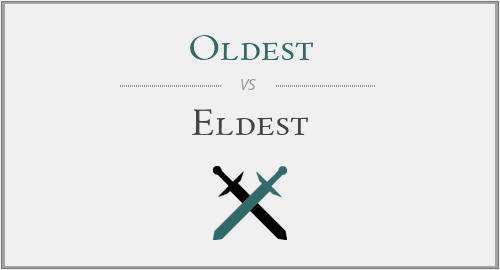Eldest is used while referring to age with respect to seniority. It is used to refer to related members of family. The word has been derived from old English ieldest and can also be said as ‘most grown up’ in simple terms. Examples –
· Jimmy has 3 daughters. The eldest is 8 years old.
· The one with the beard is the eldest son of Tom. (you can’t say oldest because that could mean the person himself is old)
· The eldest person in this group is my mother. (in age but not necessarily first person to join the group)
Oldest can be referred to any object or person that are unrelated to each other. This is not the case with eldest which can only be used to compare age of related people.
For example, we can say, “this sword is oldest of all the swords”, but not “…eldest of…”
Oldest necessarily means old and is the regular superlative of this word. Oldest need not be in terms of age. It just means something or someone is old.
· I will teach you one of the oldest methods to solve the puzzle.
· This is the oldest room of our school.
· The city is one of the oldest in the country.
· The oldest document of the house has all the relevant details which are not present in the newer versions.
· She is one of the oldest members in our group.

Consider this example –
The oldest member of this group is also the youngest (in age), the eldest member is 83 years old and has just joined the group.
We can say the following about this sentence.
· The senior most member (eldest) is not the oldest member in the context of the group.
· For the context group, the oldest member is actually the youngest in age (not the eldest).
Here are a few sentences, try to find the answers –
1. John left his business in the name of his ____ son.
2. Trafalgar Square is the _____ place in the city.
3. I am the ____ of all the siblings.
4. The _____ members of the group were transferred to a different place to accommodate new members.




Have a discussion about this article with the community:
Report Comment
We're doing our best to make sure our content is useful, accurate and safe.
If by any chance you spot an inappropriate comment while navigating through our website please use this form to let us know, and we'll take care of it shortly.
Attachment
You need to be logged in to favorite.
Log In